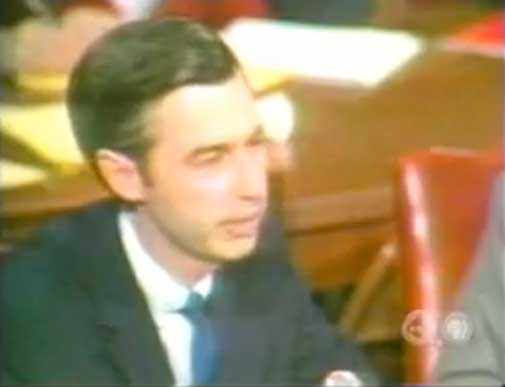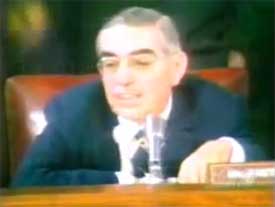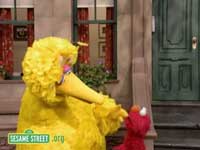
This one was inevitable: With Republicans in Congress winning seats in the 2010 midterm election and feeling their oats, and with budget cuts a hot-button issue on both sides of the aisle, Republicans are proposing a complete elimination of public funding for the Corporation for Public Broadcasting, which provides money to both PBS and public radio. What's a supporter of public broadcasting to do? Simple: Remember your history, and the time, in 1969, when Fred Rogers single-handledly saved the concept of public funding for public television...
It was May 1, 1969, and Rogers -- whose Mister Rogers' Neighborhood was, at that point, delivered by an ad hoc collection of stations on the National Educational Television network and elsewhere -- was appearing before the U.S. Senate Communications Subcommittee on funding for PBS. PBS was a new idea then, and funding it partly with federal money, then and ever since, has been a matter of some controversy.
By the time mild-mannered Rogers' turn came to speak, committee chairman Sen. John Pastore, a Democrat from Rhode Island -- the same man who had led a crusade against the impropriety of commercial broadcast network TV content -- wasn't exactly inclined to approve the funding. He'd never seen a single one of Fred Rogers' TV programs for children, and had no idea what to expect when the kids' TV host from Pittsburgh sat at the witness table.
"All right, Rogers," he grumbled, not even giving his witness the courtesy title of "Mister" he used in the title of every program. "You've got the floor."
Rogers explained that he had prepared and brought a written statement that would take about 10 minutes to read, a philosophical statement about television. Then he said if the senator would promise to read it later, Rogers would trust his word, and would rather speak from the heart.
That threw Pastore for a loop of sorts -- and as Rogers described his show after Pastore admitted he had never seen it, the gruff senator softened visibly with every sentence, nodding in agreement and seeming relieved, and astounded, to hear about a show that told small children, "I like you, just the way you are."

"Well, I'm supposed to be a pretty tough guy," Pastore said, "and this is the first time I've had goosebumps for the last two days."
Having hooked the senatorial fish, Rogers reeled him in, singing him the song, "What Do You Do with the Mad That You Feel?" Not just a line, or a verse. The entire song.
And all these cynical political vets and observers in the hearing room just melted. It was Mr. Rogers Goes to Washington, just as purely and victoriously -- and when Fred Rogers stopped singing, Pastore responded with the best possible review.
"I think it's wonderful," he said -- not once, but twice. And then he told Rogers, simply but firmly, with a smile, "Looks like you just earned the 20 million dollars."
(You can read the transcript of Fred Rogers' appearance before the committee by clicking HERE, or see it by watching below. But come back, please, because I have a point to make.)
So how does this 1969 triumph, at the very birth of PBS, pertain to 2011, and what supporters and representatives of CPB should do to combat the latest threat of public funding elimination? Easy. Here's how.
What CPB should NOT do is drag out the old dry, if accurate, arguments, about how federal funding provides only a tiny percentage of each public TV and radio station's operating budget. It should not trot out long laundry lists of the shows it has provided in the past, or plans to provide in the future, which are the kinds of educational, inspirational, enlightening programming a nation should be happy to embrace and support.
What it SHOULD do is ask for an opportunity to state its case at a subcommittee hearing -- and bring to the table a trio of expert witnesses. Let THEM speak to the politicians calling for an end of CPB funding, as a nation watches, and let them -- like Fred Rogers 42 years ago -- speak plainly about children, and caring, and inspiration.

The three witnesses? Kermit the Frog, Big Bird and Elmo.
Virtually everyone who's ever acted opposite a Muppet, be it on PBS's Sesame Street or the syndicated Muppet Show or elsewhere, says the same thing afterward: They forgot they were talking to foam likenesses operated by puppets, and couldn't help but just relate to them as their characters. Senators, and congresspeople are no different, and would not be immune to their childish charms.
Besides, that hearing room image -- three cuddly puppets, up against the gruff men and women of Washington -- would make the front page, and front blog page, and main newscast, of every news operation in the country.

And from that point on, as the Republicans demand to close the purse strings on CPB, they'll be the ones who are trying to silence Big Bird, Kermit and Elmo.
When Fred Rogers brought the spirit of his neighborhood to a federal hearing room, he saved public broadcasting. The Muppets from Sesame Street, by bringing the spirit of THEIR neighborhood, can do the same thing.